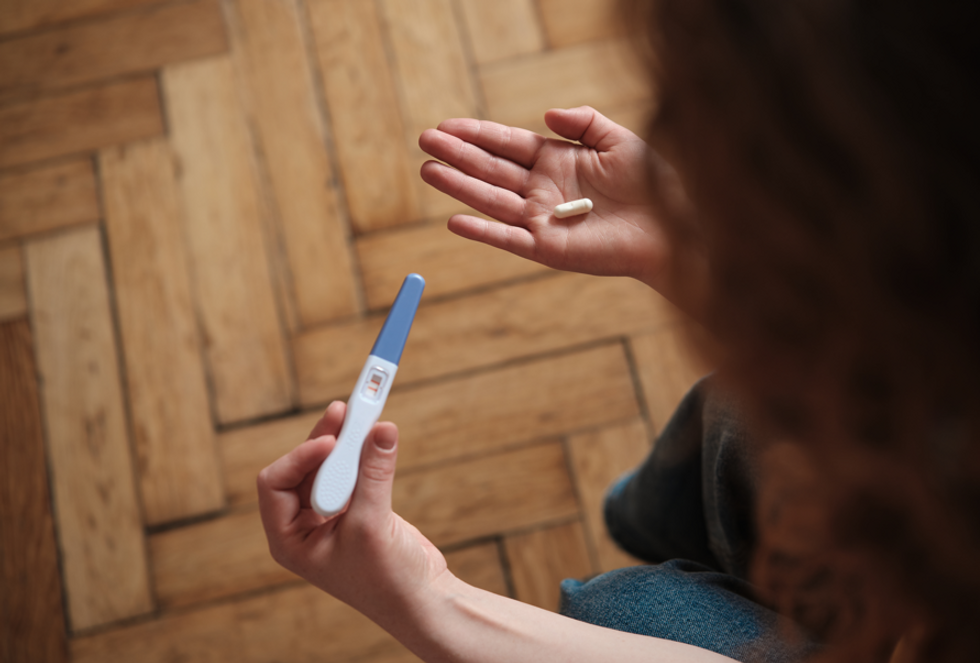Eliana Silver
Guest Reporter
Demand for abortions has surged as women are coming off the contraceptive pill in favour of “menstrual tracking apps”.
Data from abortion clinics in England and Wales showed a shift from hormonal contraception to more natural yet “less reliable” methods over the last five years.
The study, published in the British Medical Journal, compared the contraceptive methods used by the 33,495 women getting abortions in 2018, to the ones used by the 55,055 women seeking them in 2023.
The number of abortion patients using natural methods went from 0.4 per cent in 2018 to 2.5 per cent in 2023. The average age of the users also fell from almost 30 to 27.

These “fertility awareness” methods come in the form of smartphone apps that help track a woman’s fertility and cycle, encouraging them to only have sex on days they are not fertile.
The data also found that the use of hormonal methods among women getting abortions dropped from 19 per cent in 2018 to 11 per cent in 2023.
The amount who were not using any form of contraception when they became pregnant skyrocketed from 56 per cent in 2018 to 70 per cent in 2023.
At the same time as attitudes surrounding contraception shifted, abortions have gone up from 201,000 in 2018 to 251,000 in 2022.
MORE LIKE THIS:
The Faculty of Sexual and Reproductive Healthcare has warned that relying on fertility apps is only about 76 per cent effective at preventing pregnancy, compared with the 99 per cent effectiveness of the contraceptive pill.
The study, led by NHS Fort Valley’s Dr Rosie McNee said there has been “increasing use of less reliable methods [of contraception], which in turn has a potential to increase unintended pregnancies”.
The report concluded: “While the rise in abortion rates is multifactorial, one aspect that needs scrutiny is any change in contraceptive use and particularly this surge in the use of e-health including fertility apps, period tracker apps and natural family planning apps.”
The authors also linked the rising hesitation of using hormonal contraception to social media, noting that women in the UK are faced with long waiting lists to access contraception.

NHS leaders have cautioned about believing misinformation online about hormonal contraception, including claims that it causes infertility.
Data has shown that the number of women using the pill as their main form of contraception has fallen from 47 per cent in 2012-13 to 27 per cent in 2022-23.
Dr Patricia Lohr, director of research and innovation at the British Pregnancy Advisory Service, said: “This study of abortion patients showed a rise in the use of fertility awareness-based methods and a decline in hormonal contraception. This may indicate women are making different contraceptive choices or can’t get the methods they want.”
Bekki Burbidge, from the Family Planning Association, added that there was a bigger interest in natural methods over the last few years.
“This is probably for a range of reasons including a lack of access to other methods, a shift towards wanting non-hormonal methods with fewer possible side effects, and the wider availability of fertility awareness apps. Fertility awareness-based methods can work well for some people but they’re typically less effective at preventing pregnancy,” she said.
Find Out More...
Data from abortion clinics in England and Wales showed a shift from hormonal contraception to more natural yet “less reliable” methods over the last five years.
The study, published in the British Medical Journal, compared the contraceptive methods used by the 33,495 women getting abortions in 2018, to the ones used by the 55,055 women seeking them in 2023.
The number of abortion patients using natural methods went from 0.4 per cent in 2018 to 2.5 per cent in 2023. The average age of the users also fell from almost 30 to 27.

These “fertility awareness” methods come in the form of smartphone apps that help track a woman’s fertility and cycle, encouraging them to only have sex on days they are not fertile.
The data also found that the use of hormonal methods among women getting abortions dropped from 19 per cent in 2018 to 11 per cent in 2023.
The amount who were not using any form of contraception when they became pregnant skyrocketed from 56 per cent in 2018 to 70 per cent in 2023.
At the same time as attitudes surrounding contraception shifted, abortions have gone up from 201,000 in 2018 to 251,000 in 2022.
MORE LIKE THIS:
- 'It is very difficult!' Vaccine injury campaigner speaks out on 'indescribable trauma'
- Flu jabs axed for over-50s 'fuelling NHS winter crisis', experts warn
- Dementia warning as scientists find common trait in children which increases risk of health condition
The Faculty of Sexual and Reproductive Healthcare has warned that relying on fertility apps is only about 76 per cent effective at preventing pregnancy, compared with the 99 per cent effectiveness of the contraceptive pill.
The study, led by NHS Fort Valley’s Dr Rosie McNee said there has been “increasing use of less reliable methods [of contraception], which in turn has a potential to increase unintended pregnancies”.
The report concluded: “While the rise in abortion rates is multifactorial, one aspect that needs scrutiny is any change in contraceptive use and particularly this surge in the use of e-health including fertility apps, period tracker apps and natural family planning apps.”
The authors also linked the rising hesitation of using hormonal contraception to social media, noting that women in the UK are faced with long waiting lists to access contraception.

NHS leaders have cautioned about believing misinformation online about hormonal contraception, including claims that it causes infertility.
Data has shown that the number of women using the pill as their main form of contraception has fallen from 47 per cent in 2012-13 to 27 per cent in 2022-23.
Dr Patricia Lohr, director of research and innovation at the British Pregnancy Advisory Service, said: “This study of abortion patients showed a rise in the use of fertility awareness-based methods and a decline in hormonal contraception. This may indicate women are making different contraceptive choices or can’t get the methods they want.”
Bekki Burbidge, from the Family Planning Association, added that there was a bigger interest in natural methods over the last few years.
“This is probably for a range of reasons including a lack of access to other methods, a shift towards wanting non-hormonal methods with fewer possible side effects, and the wider availability of fertility awareness apps. Fertility awareness-based methods can work well for some people but they’re typically less effective at preventing pregnancy,” she said.
Find Out More...
